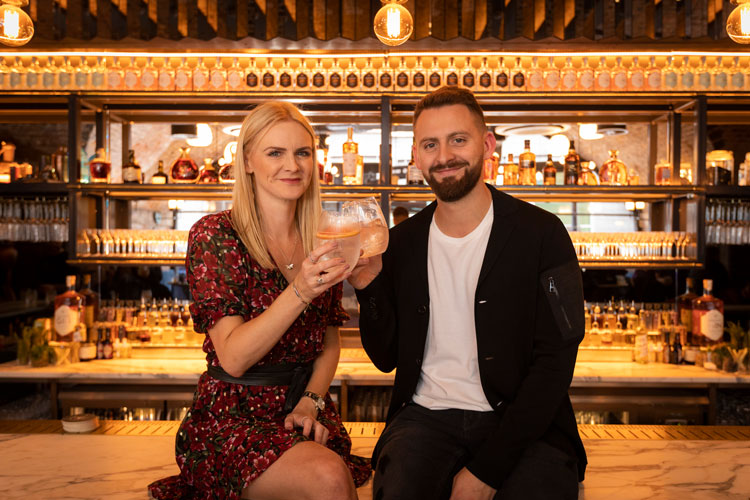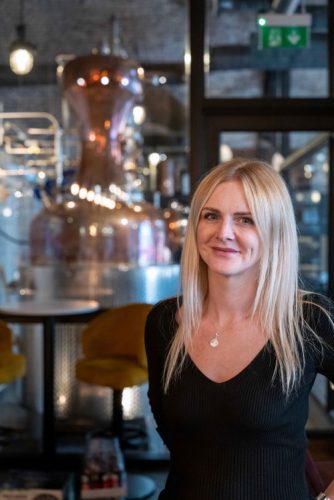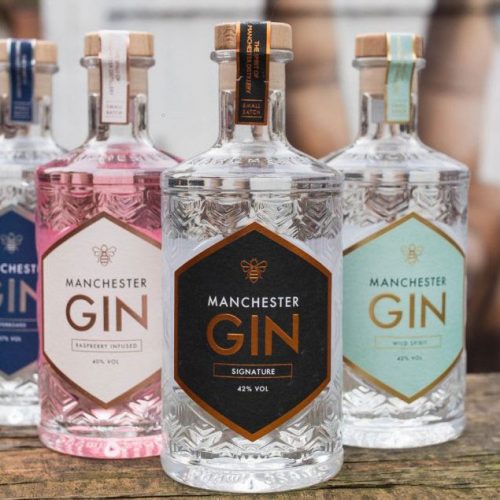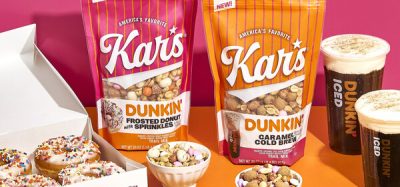How to build a gin distillery…in your dining room
- Like
- Digg
- Del
- Tumblr
- VKontakte
- Buffer
- Love This
- Odnoklassniki
- Meneame
- Blogger
- Amazon
- Yahoo Mail
- Gmail
- AOL
- Newsvine
- HackerNews
- Evernote
- MySpace
- Mail.ru
- Viadeo
- Line
- Comments
- Yummly
- SMS
- Viber
- Telegram
- Subscribe
- Skype
- Facebook Messenger
- Kakao
- LiveJournal
- Yammer
- Edgar
- Fintel
- Mix
- Instapaper
- Copy Link
Posted: 23 October 2020 | Jen Wiggins (Manchester Gin), Seb Heeley (Manchester Gin) | No comments yet
Master Distillers and Manchester Gin co-founders, Seb Heeley and Jen Wiggins, explain their journey – pre- and post-covid, along with what makes a great gin in an insightful Q&A.


Q. Please provide a brief overview about Manchester Gin, including your inspiration for setting up a distillery
Seb: “Jen and I met on a gloomy night out in Manchester in a cocktail bar. When I asked her what she was drinking, she obviously said “gin and tonic”, her first words to me! We spent that night and following dates trying to outdo one another with our gin knowledge.
“After being together for a few years, we knew we wanted to work together and initially planned to open a bar. While we were researching, visiting other bars, planning the space and what we’d offer, we came across someone making small-batch gin in the back room of a bar. When we saw the setup, we instantly thought ‘we should do that!’”
Jen: “You could say we’ve always been a bit geeky about gin. On our first few dates, we’d meet up in a Manchester bar known for having a huge gin selection. We’d work our way through the menu making notes on every gin. We made tasting notes for so many gins; this one is citrusy, this one is earthy, herbaceous, etc.
“We’re both massive foodies and love good drinks. We’d both always wanted to own a bar so that’s where we started! It’s quite nice that it’s now come full circle and after having a highly successful distillery for three years, we opened our own cocktail bar with a wonderful restaurant and an incredible team of bartenders, chefs and servers.”
Q. What were the first steps you took to set up your business?
Jen: “When we know we want to do something, we just do it. The day we discovered gin distillation in the back of a bar, we got started straight away. We started registering domains for manchestergin.co.uk on the train home, applying for licences and looking into exactly what we needed to get started.
As far as we’re aware, we have the only dining room to have been awarded a Gold Microdistillery Award from Spirit Masters.
“Initially, we stayed in our day jobs while distilling gin. We expected to make about 800 bottles of gin a year, so we set up our distillery in our dining room. We had Wendy, our copper pot still named after my mum who sadly passed away before we started the business, with the water pipe leading out through our cat flap, much to the dismay of our poor cat Florence (who we also have a small still named after).
“When things started to take off, we’d distil through the night, getting up at 2am, 4am and 6am to check on everything. I left my job in a marketing agency where I worked as an account director and would bottle, label and manage orders throughout the day, then we’d distil again through the night. We ended up making 25,000 bottles in our dining room and won international spirits awards. As far as we’re aware, we have the only dining room to have been awarded a Gold Microdistillery Award from Spirit Masters.”
Seb: “Eventually, I left my job in property development and we both went full time with the gin. We were amazed by the demand but it’s part of a still-growing trend of locally-made, independent, craft products. People love to see how their favourite products are made, visit the distillery and meet the makers.”
Q. Why did you decide on gin?
Seb: “We both love gin and it’s what we drank together when we first met – and still drink together now – so it definitely has a sentimental place in our hearts. We both have plenty of favourite gins, but we wanted to create our own perfect gin that hits the spot every time. When we first started out, we thought that if no one else wanted to drink Manchester Gin, we’d have 100 bottles to drink ourselves!
“Gin is pretty easy to make but it’s hard to make really well. It requires a spirit tasting predominantly of juniper at an ABV of 37.5 percent or higher.
“It was very fortuitous that when we started making gin, it was beginning to really take off and has become almost as popular as vodka in the UK. We’ve also found that a lot of people are wanting to drink less but drink better. People aren’t looking for the cheapest drink and to have a lot of it; rather they’re after a high-quality spirit with thoughtfully considered botanicals, mixers, garnishes, etc.”
Q. How did you create the brand – including appearance, taste, colour etc?
Jen: “It was boozy! It all started with the taste; of course, the brand identity is important, but it’s the liquid that keeps people coming back for more. We started with 10 gins that we knew we liked. We sampled them neat, then as double G&Ts, then as single G&Ts. This was all in one sitting so you can imagine the end of the session is a bit of a blur. At each stage, we got rid of some gins and made notes on the ones we loved.”
Seb: “Our aim was always to make our perfect gin, so it was really important to us to identify the botanicals that we loved before we started distilling.”
Jen: “From a branding point of view, it had to be premium; we always look for the best ingredients and products on offer, so we had to create something that we’d be proud to call our own. The other key element was creating a visual brand that would intrigue gin drinkers. Over the past few years, the gin market has blossomed, which is amazing to see but also makes it very competitive. The striking bottle we had custom made by Allied Glass has definitely helped us to stand out – and the liquid inside keeps people buying us time and time again.”
Q. What makes a good gin – taste, colour, ingredients?
Seb: “This is subjective as everyone’s palate is different but for us, a gin should tell a story – not be one-dimensional in its flavours. The flavours should develop with every sip and leave a nice long finish. When it comes to finding gins that I personally love, citrus-led always wins for me.”
Jen: “Balance. I love it when you can tell a gin’s botanicals have been well balanced. It should also take you on a journey of flavours.”
Q. How have you made yourself unique in a competitive sector?


Jen Wiggins and one of Manchester’s Gin’s stills
Seb: “We always stay true to ourselves and to the story we tell our customers. Provenance is something that we really value in the brands we buy, so we’ll always be very hands on with the business and ensure that our product and brand is true to our heart.
“With gin being such a competitive market and independent producers growing in popularity, it does get difficult to stand out. Introducing our custom bottle made a huge difference. It’s really distinctive and really looks and feels like our brand. It ensures we’re memorable and shines on the shelves, so we hopefully have the “wow” factor before someone has even tasted the gin.
“The other thing that helps us stay competitive is our curiosity. Curiosity is what has helped us launch successful products time and time again, rather than jumping on trends. We never release a product for the sake of it, but as we’re always experimenting, we’ve always got something up our sleeves which keeps our customers engaged and excited.”
Jen: “The other thing is that we care – not just about the business, but the business’ impact. I think as a society we’re becoming far more aware of our social, environmental and cultural footprint and that is evident from the brands that are successful and seeing strong growth.
“We support local charities and people and are working hard to reduce our global impact. We use 55 percent recycled glass for our bottles and have managed to remove almost all plastic from our packaging, send zero percent of our waste to landfill, and have pledged to be carbon neutral by 2021. These are values close to our hearts and we have created a fantastic team of others who share them, which takes us from strength to strength.”
Q. What hurdles have you overcome and how?
Jen: “All of them! Honestly, it feels like there’s a new challenge behind every corner. It was definitely a challenge when we started to grow so quickly as we didn’t have time to figure everything out and just worked it out as we went along.
Before we scaled production up, we were working from our tiny dining room, distilling through the night so we had time to bottle, label, ship and get business admin done in the day.
“Now, like every single business, we’re faced with a totally different and terrifying challenge that is the uncertainty of Covid…we’re just doing our best to adapt and thrive. We’ve introduced virtual events, which have done really well; we switched production over from gin to hand sanitiser – initially just to support front-line services, but that’s become an income stream itself now; and are continually adapting with the bar and restaurant.
Make sure it’s safe – it’s an explosive process.
“When it comes to hurdles, this is definitely a difficult one, but as with everything else, I think our strength is in our ability to adapt. We make decisions quickly and don’t ‘um and ah’ over things that need to get done. We’ve always been ‘no nonsense’. If you want to do something and believe in it, do it!”
Q. What is your best piece of advice to those starting out in the same sector?
Seb: “As boring as this may sound, make sure you get your safety, duty and licencing sorted. It’s not the sexy bit, but it’s so important and it’ll bite you in the bottom if you don’t handle it properly. You need a distiller’s licence, approval to distil using your premises and processes, and to pay duty on every drop of alcohol you produce.
“You need to respect that when you put heat and alcohol together, you’re creating a potentially dangerous situation. Make sure it’s safe – it’s an explosive process. Get sign off from the fire brigade and environmental health. 

“You’re also dealing with an age-restricted product, so there’s a responsibility with that when it comes to selling, distributing, licencing, etc.”
“Moreover, you need to remember that you’re creating a product that’s intended to be consumed by the public, so you need to take their health and safety into account if you want to sell or distribute what you make.
“Find someone to work with who you want to spend all day every day with – Jen and I wanted to start a business together so we could spend more time with each other!
“We always say, if you think of a great idea and aren’t risking everything – the roof over your head, the dinner on your table – then throw yourself into it wholeheartedly and just give it a shot. We are big believers in backing yourself – if you don’t do it, no one else will.”
Q. How has your market evolved and how has this impacted your company?
Jen: “There’s far more variety in the gin market now than there was when we started out. That variety is broadening the horizons of our consumers, opening up new flavours and styles and breeding some amazing creativity in the industry.
“The market has also grown enormously: in 2019 there were three times as many distilleries as there were in 2012. That huge growth has bred competition which has raised the quality of gin even further.”
Q. How did you safely set up production for hand sanitiser during the pandemic?
Seb: “As a distillery, we’re used to using large quantities of neutral grain spirit (NGS), which is our base spirit. It’s really quick to switch – we basically turned the gin still into a giant kettle for the distilled water, then we’re using our blending tanks to mix together other ingredients. We’ve set up a separate sanitiser bottling line to ensure the two production lines are kept separate, which has actually allowed us to bring our original filling machine back to life – the one that started life in our dining room!”
Q. How do you see the future of your business progressing post-Covid?
Jen: “Last year was incredibly exciting as we moved into our forever home, with big plans to grow our business further from our incredible new distillery, which is capable of producing a million bottles of gin a year.
“Our plan was to take the gin that we have into more international markets; a process that has become more difficult due to the state of the world right now! For the UK market we’re developing special editions to showcase the creativity we have on our team and give our customers the skills and inspiration to explore their own creativity in our visitor experience. We would like this to be the number one distillery experience in the UK.
“We’ve also just launched a British Vermouth and a Vodka, which has been awarded a Master at the Spirits Masters. We’re passionate about good drinks, not just good gin, so we’re also developing products away from gin.
“In terms of changes since Covid, I think we need to accept that there might not be a true post-Covid for a while. During lockdown, we developed a virtual tasting experience, which has been successful, so we’re now adapting this into a package for corporate events. Our visitor experience is a really important part of the distillery, so we want to make sure we’re still offering that engaging interaction with our products, even when people are less able to travel or meet in groups.”
Biographies
Jen Wiggins is a marketing mogul turned Master Distiller who co-founded the award-winning artisan drinks company, Manchester Gin. Jen now runs the hugely successful northern brand alongside her partner, Seb Heeley.
After 10 years working in property development, Blackpool born Seb Heeley created Manchester Gin alongside Jen Wiggins after falling in love with both her and the city. The Master Distiller is passionate about drink development and works alongside Jen to push the brand forward.
Related topics
Beverages, Flavours & colours, New product development (NPD), Processing, Product Development









